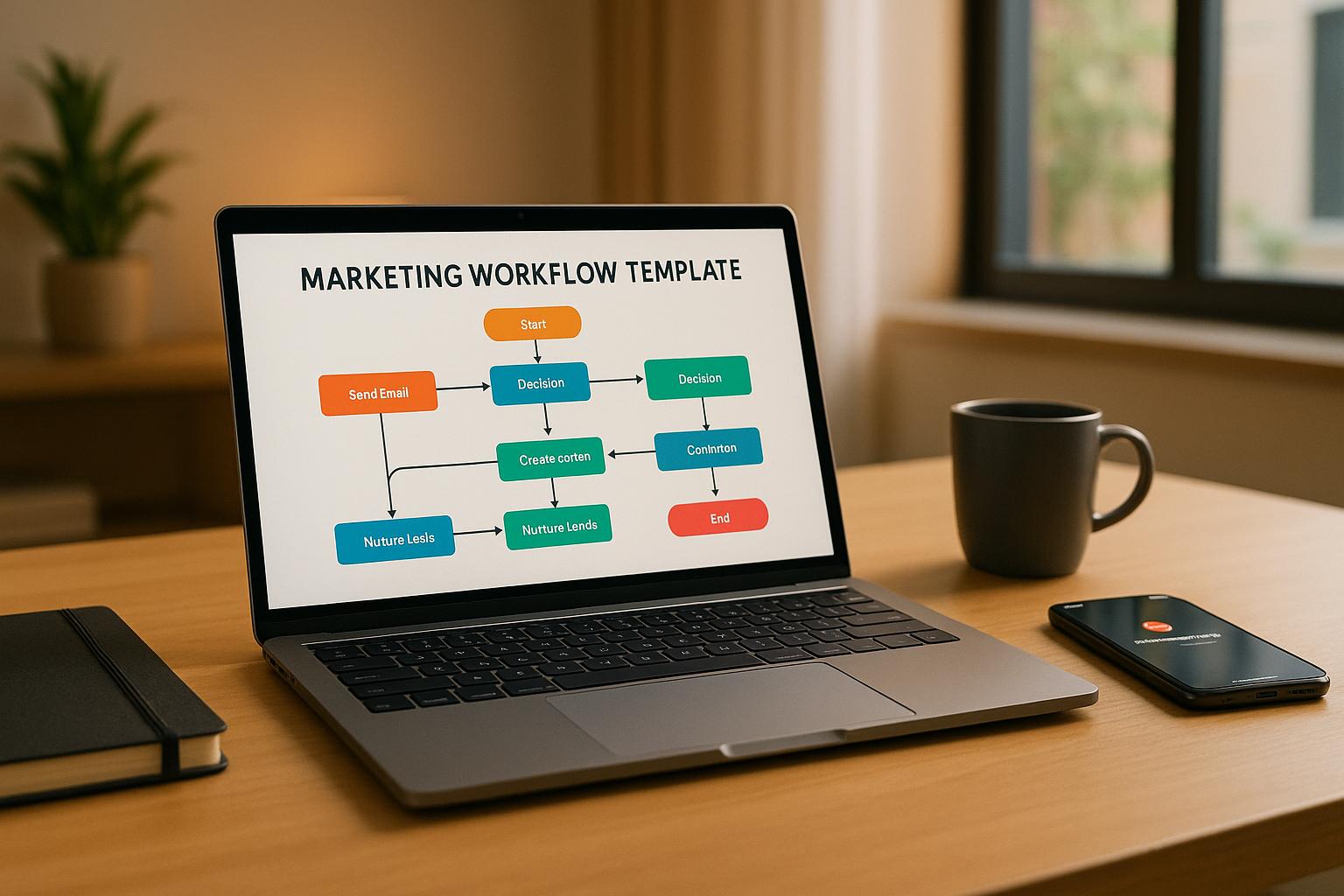97% of home sales now happen online, making digital content marketing essential for real estate in 2025. To succeed, focus on these key strategies:
- Short Videos: 30-60 second videos on Instagram and YouTube drive engagement.
- AI Tools: Use AI for property descriptions, virtual staging, and video editing to save time and money.
- Virtual Tours: Homes with virtual tours get 87% more views and sell 31% faster.
- Local Area Guides: Showcase schools, amenities, and community events to build trust with buyers.
- ROI Tracking: Use analytics tools to measure success and optimize campaigns.
Top Tools: Matterport for virtual tours, Write.Homes for descriptions, and OpusClip for video editing.
Best AI Tools for Real Estate in 2025
2025 Real Estate Content Marketing Trends
The real estate marketing world is evolving fast, with digital tools changing how properties are presented and sold. Here’s a look at the major trends shaping real estate marketing in 2025. These trends focus on using advanced digital solutions to increase engagement and speed up the sales process.
Short Videos and Social Media Stories
Short videos are now a cornerstone of real estate marketing. Here’s why:
- 75% of viewers prefer mobile-friendly content.
- Instagram posts generate twice the engagement compared to traditional posts.
- Platforms like Facebook, YouTube, and Instagram dominate, with usage rates of 75%, 70%, and 58%, respectively.
- According to 39% of marketers, 30-60 second videos provide the best return on investment.
AI Tools for Content and Targeting
AI tools are changing the game by automating content creation and offering personalized marketing. Here are some standout AI tools:
| Tool | Primary Use | Starting Price |
|---|---|---|
| Write.Homes | Property Descriptions | Free (up to 1,000 words) |
| Virtual Staging AI | Property Staging | $16/month (6 photos) |
| OpusClip | Video Editing | Free (60 mins/month) |
These tools make it easier to create polished, targeted content without breaking the bank.
VR and AR Property Marketing
Virtual and augmented reality are revolutionizing how properties are viewed. The market for these technologies is expected to hit $369.765 billion by 2032. Benefits include eliminating geographical barriers and reducing sales cycles by up to 40%. Some popular platforms include:
- Matterport: Offers immersive 3D virtual tours for global property exploration.
- Realtor.com: Uses VR in listings to help buyers view properties remotely.
- IKEA Place and Houzz: Allow buyers to visualize furniture placement and renovations with AR.
Statistics show that 68% of homebuyers are more likely to schedule an in-person viewing after experiencing an AR virtual tour. However, 77% of realtors have yet to adopt VR, making this a prime opportunity for those ready to embrace the technology.
Top-Performing Content Types
The latest trends show these content types are delivering strong results in the real estate market.
Digital formats are driving both engagement and conversions in 2025. In fact, 99% of homebuyers aged 24 to 57 rely on the internet to search for homes.
Digital Property Tours
Virtual tours are now a must-have for real estate marketing in 2025.
| Metric | Impact |
|---|---|
| Property Views | 87% more views |
| Sales Speed | 31% faster sales |
| Buyer Expectations | 54% of buyers won’t consider showings without a virtual tour |
| Online Sales | 97% of home sales happen online |
Homes with video content see 403% more inquiries, and virtual staging speeds up sales by 75%. Platforms like Matterport provide tools like interactive floor plans, 360° room views, guided walkthroughs, and mobile-friendly options.
Local Area Guides
Well-crafted area guides can make a big difference. They often include:
- Interactive maps showcasing local amenities
- School district performance data
- Crime rate statistics
- Walkability scores
- Local business directories
- Community event calendars
These guides help real estate agents establish themselves as local experts while building trust with potential buyers.
Home Buying and Selling Guides
Personalized content resonates with 72% of consumers. Successful guides focus on educating first-time buyers, offering market analysis, comparing financing options, and providing negotiation tips. They also address common challenges like applying for mortgages, managing down payments, navigating home inspections, and understanding closing procedures.
Specialized content is also gaining attention. For instance, guides about energy-efficient homes and sustainable living are becoming increasingly popular.
sbb-itb-2f9da9d
Content Marketing ROI Tracking
Tracking ROI is a crucial step in refining digital marketing strategies for real estate. With advanced analytics tools, it’s now easier than ever to measure the impact of your efforts and make data-driven decisions.
Key Success Metrics
In real estate, content marketing performance often follows clear trends. For example, SEO efforts boast an impressive 1,389% ROI, while social media campaigns average a more modest 182% ROI. To measure success effectively, focus on these key metrics:
| Metric Type | Average Performance |
|---|---|
| Organic Search CTR (Position 1) | 39.6% |
| Email CTR | 4.9% |
| PPC CTR | 1.9% |
| Organic Lead Cost | $416 |
| Paid Lead Cost | $480 |
Metrics like time spent on a page, social shares, virtual tour completion rates, and inquiry form submissions can provide additional insights, especially for property listings. These data points help identify what’s working and where improvements are needed.
Analytics Software Options
Analytics tools can transform how businesses understand their audience and optimize efforts. For instance, after adopting Google Analytics 4, McDonald’s Hong Kong reported a 550% increase in app orders.
"Google Analytics allows us to look at our data across platforms – web and app – to understand the full journey of our users. We’ve been able to cut our reporting time by 50%." – Sara Swaney, Director of Advancement, 412 Food Rescue
Similarly, HubSpot users often see major gains within a year, such as:
- 114% growth in web traffic
- 55% more deals closed
- 43% higher ticket resolution rates
These tools enable businesses to track critical metrics while saving time and resources, ensuring smarter decision-making.
Lead Cost Calculations
Lead costs can vary significantly depending on the market and platform. According to Sierra Interactive‘s 2023 data, here’s what you can expect:
| Campaign Type | US Market | Canadian Market |
|---|---|---|
| Buyer Campaigns | $9–$13 | $5–$9 |
| Seller Campaigns | $26–$30 | $24–$28 |
Platform-specific costs also differ:
- Zillow leads: $20–$60, depending on the market
- Realtor.com non-exclusive leads: $200/month
- Realtor.com exclusive leads: $1,000/month
Social media platforms often provide more affordable leads, converting at 1–3% over a 12-month incubation period. In contrast, Zillow leads convert at a higher 7% rate with a shorter 3–6 month incubation period.
To maximize ROI, it’s recommended to allocate 10% of total income to lead acquisition. While organic channels may take longer to yield results, they often provide stronger returns over time.
Content Calendar Management
A well-structured content calendar is essential for maintaining consistent online visibility and engagement, especially for real estate professionals. It works hand-in-hand with advanced tools to deliver measurable results.
Long-term vs. Time-sensitive Content
Balancing long-lasting content with timely updates ensures steady traffic while staying relevant. Here’s a breakdown of how to categorize your content effectively:
| Content Type | Purpose | Update Frequency | Examples |
|---|---|---|---|
| Evergreen | Offers ongoing value | Every 6–12 months | Home buying guides, staging tips |
| Seasonal | Tied to specific times | Quarterly | Halloween home tours, spring market updates |
| Market-driven | Reflects current trends | Weekly/Monthly | Price trends, interest rate updates |
| Time-sensitive | Focuses on immediate needs | As needed | New listings, open houses |
Using this strategy across different platforms can help expand your content’s reach and impact.
Cross-Platform Content Planning
Once your content types are set, distributing them effectively across platforms ensures you reach the right audience. Here’s a quick guide:
| Platform | Best Content Types | Recommended Tools | Monthly Cost |
|---|---|---|---|
| Long-form content, listings | Meta Business Suite | Free | |
| Visual property tours | Later, Planoly | $14–99 | |
| Market insights | Buffer, Taplio | $74–99 | |
| Design inspiration | Loomly | $14+ |
Content Schedule Automation
Automation tools simplify the scheduling process and help ensure timely interactions with your audience. Here are some key performance results from using automation:
- 30% increase in client leads within 90 days
- 20% improvement in engagement metrics
- Successfully pre-scheduled three months of content
Seasonal Planning Highlights:
- January: Focus on email campaigns with New Year themes
- February: Post tri-weekly social updates featuring listings and market insights
- March: Launch personalized referral marketing campaigns
- April: Host open houses with virtual components
- October: Use local themes for seasonal marketing
- November: Run client appreciation initiatives
- December: Share year-end market analyses and predictions
To maintain high-quality content while using automation:
- Schedule posts during peak engagement hours.
- Combine automated posts with real-time interactions to keep content fresh.
- Regularly review and adjust your schedule based on performance.
- Use analytics tools to fine-tune timing and content focus.
Conclusion
The real estate content marketing world in 2025 calls for a smart mix of digital tools and personalized approaches. To thrive in this changing landscape, you need a strong online presence that speaks directly to today’s buyers and sellers.
Top-notch visual content and cutting-edge technology are key drivers of success. As Miroslav Jirku and other industry experts point out, creating personalized experiences that build genuine connections is now at the heart of effective real estate marketing.
Data backs up the need for a multi-channel approach, emphasizing the importance of careful planning and strategic use of social media to generate leads.
Here are some key areas to focus on for a winning content strategy:
| Focus Area | Key Implementation | Expected Impact |
|---|---|---|
| Visual Content | Professional photos, virtual tours | 31–75% faster sales |
| AI Integration | Automated targeting, personalization | $110–180B industry value |
| Local Marketing | Hyperlocal content, community focus | Better lead quality |
| Mobile Optimization | Short-form video, responsive design | Higher engagement rates |
Agent Image highlights that 2025’s real estate market is firmly rooted in digital channels and is evolving quickly. Staying flexible and building strong connections with your audience is non-negotiable. Leveraging these advancements can give you a competitive edge.
With 71% of buyers and 81% of sellers reaching out to just one agent, making a great first impression is more important than ever. By applying these strategies consistently across your digital platforms, you’ll be in a strong position to attract and convert high-quality leads in this competitive space.



